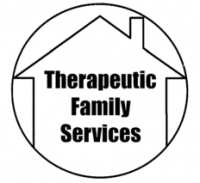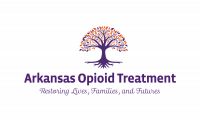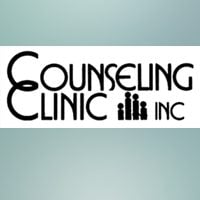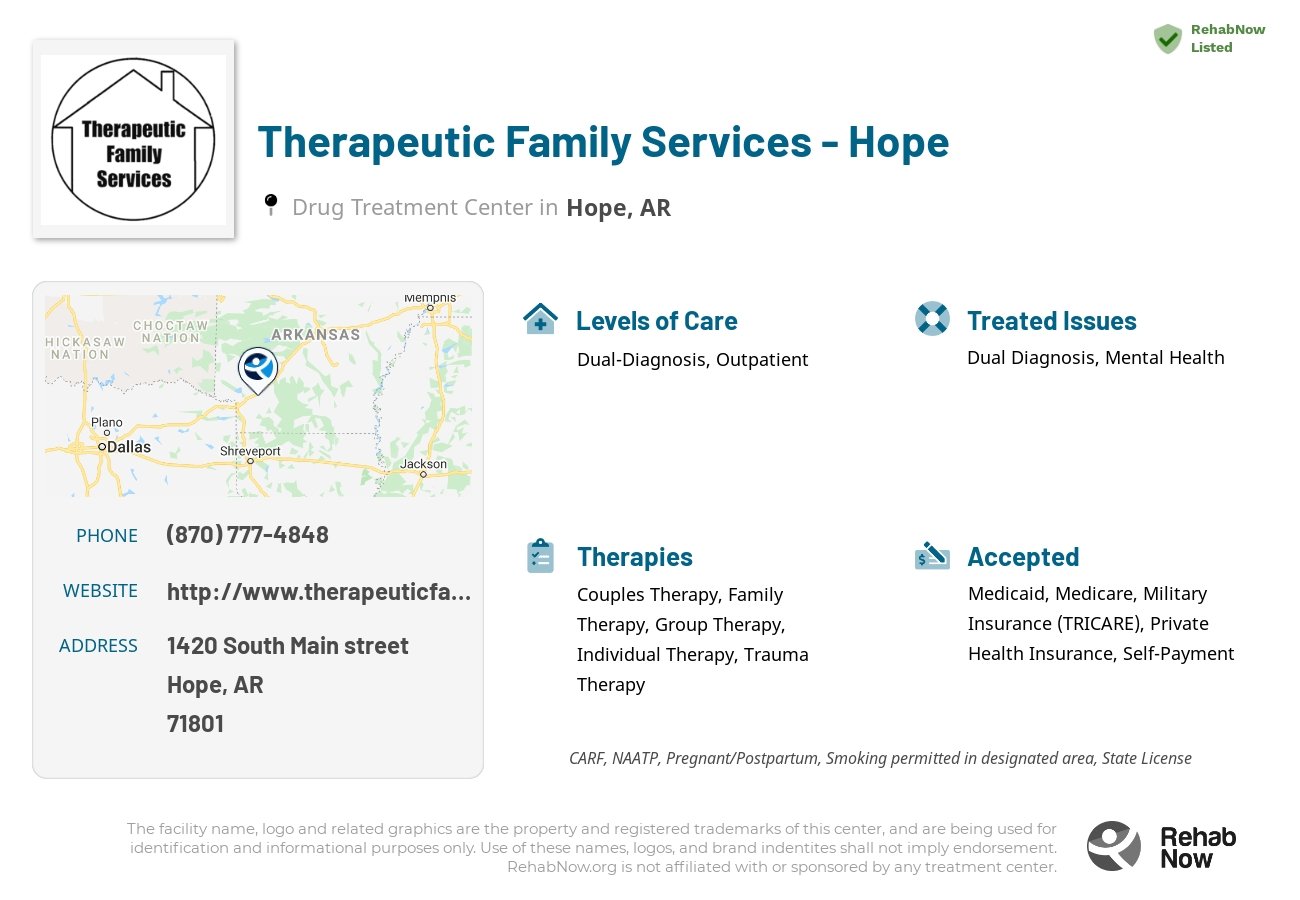
Therapeutic Family Services - Hope
Drug Rehab Center in Hope, Arkansas
- Mental Health
- Dual Diagnosis
Therapeutic Family Services - Hope is a comprehensive mental health and substance abuse treatment clinic located in Hope, Arkansas, offering personalized and evidence-based care, which includes cognitive behavioral therapy, medication management, and a variety of activities and programs, to support the recovery of individuals and families struggling with addiction.
About This Arkansas Facility
Therapeutic Family Services - Hope is a multi-disciplinary mental health and substance abuse treatment clinic located in Hope, Arkansas. The clinic offers a wide range of services, including cognitive behavioral therapy, 12-step support groups, family therapy, and group therapy, to name a few. The team of professionals at Therapeutic Family Services - Hope are dedicated to providing comprehensive and personalized treatment to individuals, couples, and families who are struggling with addiction and substance abuse.
Therapeutic Family Services - Hope provides many services to help individuals and families struggling with addiction, such as individualized treatment plans, medication management, psychological assessments, and relapse prevention. They also offer a variety of activities and programs to support their clients’ recovery, such as recreation, exercise, and educational classes. Additionally, the clinic provides case management, guardian ad litem, and legal services for those in need.
Therapeutic Family Services - Hope has many accreditations, licenses, and awards. They are accredited by the Commission for Accreditation of Rehabilitation Facilities (CARF) and are licensed by the Arkansas Department of Human Services. They also have been awarded the Arkansas Substance Abuse Prevention and Treatment (ASAP) grant and have achieved Level 3 certification from the Arkansas Department of Health. Moreover, they are a member of the National Association of Addiction Treatment Providers, which promotes high quality, evidence-based addiction treatment services.
Genders
Ages
Modality
Additional
Conditions and Issues Treated
When addiction and psychiatric issues co-occur, the addict’s recovery is more successful when both conditions are treated. A dual diagnosis refers to a condition in which the patient is diagnosed with two health issues: addiction and bipolar disorder. The most common therapies are psychotherapy, behavioral therapy, spiritual counseling, 12-step programs, and medication management.
Levels of Care Offered at Therapeutic Family Services - Hope
This center offers a variety of custom treatment tailored to individual recovery. Currently available are Dual-Diagnosis, Outpatient, with additional therapies available as listed below.
An outpatient treatment program is set up to help with alcohol or drug addiction or a co-occurring disorder. The patient must attend the facility for their therapy and other programs but can return home each night.
The frequency of mandatory attendance decreases after much of Therapeutic Family Services - Hope‘s program is complete.
Outpatient treatment is a recovery approach that allows recovering addicts to live at home while getting rehab for addiction
An outpatient can include day treatments which include attending group sessions one hour per week. A person living in an outpatient environment may be allowed the opportunity to work full time if they choose to and continue studies without interruption from drugs/alcohol.
Outpatient treatment is an option for people who want to maintain their careers and families. Outpatients live at home but attend treatment such as individual counseling, group counseling, or twelve-step meetings during the day.
Therapies & Programs
At Therapeutic Family Services - Hope , to learn from past mistakes and improve one’s situation, the recovering person meets individually with a therapist. The counselor or therapist will address addiction causes, triggers, mental issues, dual diagnosis, and aftercare plans during this time. This is a very intense and challenging process. Some clients find it easier to open up to someone other than family or friends who understand their struggles with addiction.
Couples therapy sessions are typically used to help couples in recovery from drug addiction work through their issues. These types of sessions can be beneficial for many reasons, including the fact that they add a layer of accountability when both partners in a couple are recovering from addiction.
Therapy can also provide addicts with another effective way to cope with stress and avoid relapse during difficult situations. This type of therapy can help improve communication with their partners, which can strengthen the relationship and prevent future problems that might lead to relapse.
Family therapy is a crucial part of drug treatment and getting sober. It is one of the most effective ways to help addicts stay on the path to long-term sobriety. An addict’s family can play a vital part in helping them to avoid relapse. They can spot the warning signs and help them get back on track.
In group therapy, recovering addicts meet with a therapist and other people in recovery. Some groups are closed, meaning only people who share the same addiction or problem can attend. Others are open to anyone who wants to stop using drugs or drinking alcohol. Group therapy sessions typically focus on one topic each week or month so that recovering addicts can discuss issues they face daily.
Trauma therapy allows people to face and learn from past traumas.
Many people suffer childhood traumas that lead to adult addiction. During treatment at Therapeutic Family Services - Hope [/type], you can move forward in your recovery and reclaim your sober future! Trauma is a common cause of psychological disorders like Addiction Disorder. It’s common in Addictive Disorders patients because traumatized people have strong emotions or thoughts that lead to addictive behaviors.
Cognitive Behavioral Therapy (CBT) is based on the idea that how we feel, think and act all interact together. It helps people explore their thoughts for problems (or false beliefs) that influence their mood and actions. CBT is very goal-oriented, which means that the therapist and patient work together on a specific problem. In addition to helping a client focus on thoughts that can be changed, CBT also allows them to take an active role in their treatment. Our thoughts determine our feelings and behaviors; our feelings affect our thoughts, and our behaviors change our thoughts and feelings.
Payment Options Accepted
For specific insurance or payment methods please contact us.
Is your insurance accepted?
Ask an expert, call (888) 674-0062
Therapeutic Family Services Associated Centers
Discover treatment facilities under the same provider.
- Therapeutic Family Services - Malvern in Malvern, AR
- Therapeutic Family Services - Lewisville in Lewisville, AR
Learn More About Therapeutic Family Services Centers
Additional Details
Specifics, location, and helpful extra information.
Hope, Arkansas 71801 Phone Number(870) 777-4848 Meta DetailsUpdated November 25, 2023
Staff Verified
Patient Reviews
There are no reviews yet. Be the first one to write one.
Hope, Arkansas Addiction Information
Arkansas has one of the highest rates of substance abuse and addiction in the nation for drug overdoses. Methamphetamines and prescription opioids are by far the most widely abused drugs in the state. Despite the high rates, Arkansas ranked only 25th in the for drug overdose deaths in 2013.
Hope, Arkansas is located in the northeast corner of the state and is home to around 9,000 residents. In 2019, there were over 620 drug-related crimes reported in the city. Heroin is becoming increasingly popular in Hope, with 21% of people who use drugs admitting to using it. There are many drug treatment resources located throughout the state of Arkansas. There are also 12-step programs, detoxification, and sober living homes.
Treatment in Nearby Cities
- Bentonville, AR (191.2 mi.)
- Dumas, AR (121.6 mi.)
- Wynne, AR (193.2 mi.)
- Yellville, AR (185.0 mi.)
- Lake Village, AR (134.8 mi.)
Centers near Therapeutic Family Services - Hope


The facility name, logo and brand are the property and registered trademarks of Therapeutic Family Services - Hope, and are being used for identification and informational purposes only. Use of these names, logos and brands shall not imply endorsement. RehabNow.org is not affiliated with or sponsored by Therapeutic Family Services - Hope.




